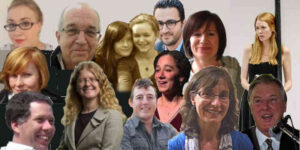Two atheists look at the facts and decide that the evidence for christianity stands up best. They both convert as a result.
Not everyone comes to the same conclusion, but it is worth reading what tipped the scales for them both.
Why do people believe …. and disbelieve?
We all like to think we’re logical, and make our choices for good reasons. But it seems that, when it comes to religion, belief and disbelief can often be based on all sorts of less logical reasons.
Psychologists confirm that most of us, especially in complex matters like religion, are likely to use intuitive thinking (going with one’s first instinct and reaching decisions quickly, often based on emotions) rather than analytical or reflective thinking (using step-by-step analysis).
As a result, it seems that believers are more likely to use intuitive thinking while unbelievers are more likely to use analytical thinking.
Which makes these two christian converts interesting – because it was careful analysis of the evidence that led Jordan Monge and Peter Byrom to believe in Jesus.
Jordan Monge
Evan as a child, Jordan was a disbeliever or a sceptic. By age 11 she was known as an atheist. At high school she argued strongly against christians, generally successfully.
She went on to study government at Harvard, and there she met a christian whose arguments weren’t so easy to rebut. They argued about the existence of God, the basis for ethics and inconsistencies in the Bible.
She found herself challenged on a number of matters, especially ethics – how could she, as an atheist, hold strong ethical views without a logical basis for them? She took a seminar on ethics with an atheist professor, and came across CS Lewis’ arguments for a connection between God and ethics.
She was also challenged to think through how the universe could exist in the first place, if there wasn’t an external cause.
From atheist to deist
These arguments convinced her. The universe and ethics demanded some sort of God. She felt comfortable with deism, the belief that there is some sort of unknowable God.
But then she read a christian book on “love as sacrifice for true good”, and then the Bible. She was already unhappy about some aspects of her behaviour at Harvard, and reading about the life and death of Jesus convinced her it would be good if it was true. But she wasn’t convinced it was actually true.
From deist to christian
So Jordan started reading everything she could on the truth or otherwise of christian faith – the Qur’an, Richard Dawkins’s The God Delusion, The Skeptic’s Annotated Bible and Christian rebuttals, Augustine, Anselm, Aquinas, Descartes, Kant, Pascal, and Lewis.
She ended up convinced that the death and resurrection of Jesus Christ were true and meaningful. But her head was so full of arguments, she didn’t seem able to trust God. Eventually she decided she just had to go with what she believed was the truth, and she was baptised as a christian.
She summed up her final decision this way:
“When confronted with the overwhelming body of evidence I encountered, when facing down the living God, it was the only rational course of action. …. never once did I have to sacrifice my intellect for my faith”.
You can read Jordan’s account at The Atheist’s Dilemma, and her blog here.
Peter Byrom
In contrast to Jordan, Peter Byrom had a christian upbringing, but it hadn’t stuck with him, and by the time he went to university in England to study drama, he had left all that behind.
He found the freedom of university life exhilarating. The culture there was one of experimentation and making one’s own rules. It was generally assumed that religion was oppressive, dull and boring, and for the unimaginative.
A friend recommended he read Richard Dawkins’ The God Delusion, and from there he got into Dawkins’ ideas on video. He particularly appreciated Dawkins’ view that we “don’t have to give respect to religious ideas. In his view, you can just say it’s wrong and that it’s stupid to believe it. I read his book again and again, and the bit I found liberating was when he defined faith as “belief without evidence”.”
Dawkins supplied the intellectual ideas, and Christopher Hitchens was “incredibly engaging”. Peter began to enjoy arguing the atheist side. Videos with titles like Dawkins destroys xxxxx, showing up the weak arguments of christian apologists, were particularly attractive.
Better apologists
But then Peter discovered better equipped christian apologists, principally John Lennox and William Lane Craig, who were able to answer the arguments of Dawkins and co. He was particularly impressed with how Craig broke his arguments down into clear premises and conclusion, then argued systematically for the truth of the premises.
He noted that Dawkins didn’t do this. The arguments in The God Delusion seemed weak in comparison. This allowed Craig to point out the flaws in Dawkins’ arguments.
So after several years of strong atheism, Peter began to challenge his atheism with good christian apologetics. This process took another few years, but he ended up “very disgruntled” with Dawkins.
Dawkins vs Craig?
Matters came to a head in 2011 when Craig toured England. Peter wanted to see the two face up to each other’s arguments and tried several ways to get Dawkins to agree to debate Craig. He even, famously, attended an event where Dawkins was speaking and asked him directly if he would do it, but Dawkins shrugged off the idea.
Peter felt let down. he had seen Dawkins scathingly dismiss the arguments of lesser thinkers, but now it was becoming clear that his arguments weren’t impressive as he thought.
Head vs heart
So Peter finally admitted to himself that the christian arguments stood up better, and that in terms of belief, he was already a christian. But he was in no hurry to commit to being a christian – he had too much freedom to lose, he felt.
But about this time he was living in a house with an ex-christian atheist and an ex-atheist christian, and he found the contrast telling. He saw the new convert getting his life together in ways that Peter admired, and eventually wanted to emulate.
So eventually, more than six years after his exploration of atheism began, he finally committed to being a christian. He continues to be involved in apologetics. You can read his story in Disillusioned with Dawkins: My Journey from Atheism to Christianity: Peter Byrom.
Atheist vs christian debates today
It is fair to say there are better atheist apologists than Richard Dawkins: philosophers like Thomas Nagel, John Mackie, Graham Oppy, Stephen Law and Paul Draper. And the existence of God is still the subject of papers and debate, as these atheist philosophers are balanced by christian philosophers like Alvin Plantinga, Richard Swinburne, Keith Ward, Brian Leftow and Peter van Inwagen.
The arguments continue, and each of us can make our own assessment of their force and the truth they reveal (or not).
A decade or more ago, at the time when Peter Byrom was thinking these issues through, public debates and online arguments on forums and blogs were all the go. But times have changed, and arguments seem less virulent and combative. People seem to be a little tired of the combat.
Is there a God has always tried to be even-handed, polite and willing to assess issues and arguments on their merits. I remain a christian, though my beliefs continue to adjust to new information.
I have outlined the intellectual journeys of Jordan and Peter in what I hope is a factual, and not divisive, manner. I hope readers find the ideas helpful.
Photos taken from Jordon Monge’s blog and Peter Byrom’s Twitter.
You may also like these
Feedback on this page
Comment on this topic or leave a note on the Guest book to let me know you’ve visited.




